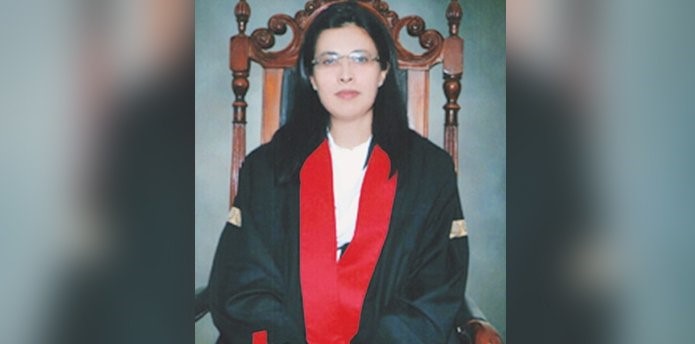Ayesha Malik shatters the glass ceiling at her likely appointment as the First Female Supreme Court Judge in Pakistan. With Justice Mushir Alam expected to retire on 17th August, the Chief Justice of Pakistan, Gulzar Ahmed, has helped in making history as he nominates Justice Ayesha for the elevation to the Supreme Court Panel. The Judicial Commission Session for this advancement has been set to be held on the 9th of September, 2021.
Born in 1966, the 54-year-old Ayesha has acquired her academic background from various esteemed places. After completing her bachelors from Government College of Commerce and Economics, Karachi, and studying law at Pakistan College of Law, Lahore. She went on to get a master’s in Law (LLM) from Harvard where she was titled London H Gammon Fellow (1999-1999).
Justice Ayesha who ranks number fourth on the judges’ seniority list of Lahore High Court (LHC) has earned this place, due to her many achievements in the judicial system of Pakistan. She is one of the only two women on this list of 40 esteemed judiciaries of LHC.
One of her most notable judgments was the exclusion of the ‘two-finger virginity test’ in rape examinations for sexual assault victims. She had stated that these tests were “humiliating” and had “no forensic value” and are “used to cast suspicion on the victim, as opposed to focusing on the accused and the incident of sexual violence.”
She is known for doing Pro Bono work for poverty reduction, skills training, and microfinancing programs for NGOs, and authoring a number of publications such as Why Trade in Financial Services: An assessment of the Agreement on Trade in Financial Services under the GATS, the 12th edition of the Global Report 2004 on the Independence of the Judiciary-Pakistan Chapter and Pakistan Secular Laws, and 1956-2006 Supreme Court Selected Cases. Additionally, she has reported on the International Law in the Domestic Courts for Pakistan to Oxford Reports and has also taught banking law and mercantile law at the University of Punjab and College of Accounting and Management Sciences, respectively.
An anonymous senior counsel commented on this nomination “After a little while we have heard positive news which is very refreshing. Otherwise, we have been hearing bad news of disagreements and controversies in relation to the Judicial Commission of Pakistan” but he also expressed his distress at possible opposition by bar associations and councils at this appointment.
Sindh High Court Bar Association president Salahuddin Ahmed, also positively commented on Justice Malik’s performance as a judge and remarked that it would be good to see more women at higher positions in the judiciary. He also added that
“Had the seniority principle been followed, we would have had a woman chief justice of the LHC and a judge of the Supreme Court back in 2002-03 when Justice Fakhrunissa Khokar was wrongly and repeatedly bypassed,” and
“We are against the principle of pick and choose and thus we cannot support any out-of-turn appointment made to the apex court by the JCP unless it frames consistent objective criteria for making such choices,”



